Purdue Pitch Competition yields innovations to improve campus life, benefit environment
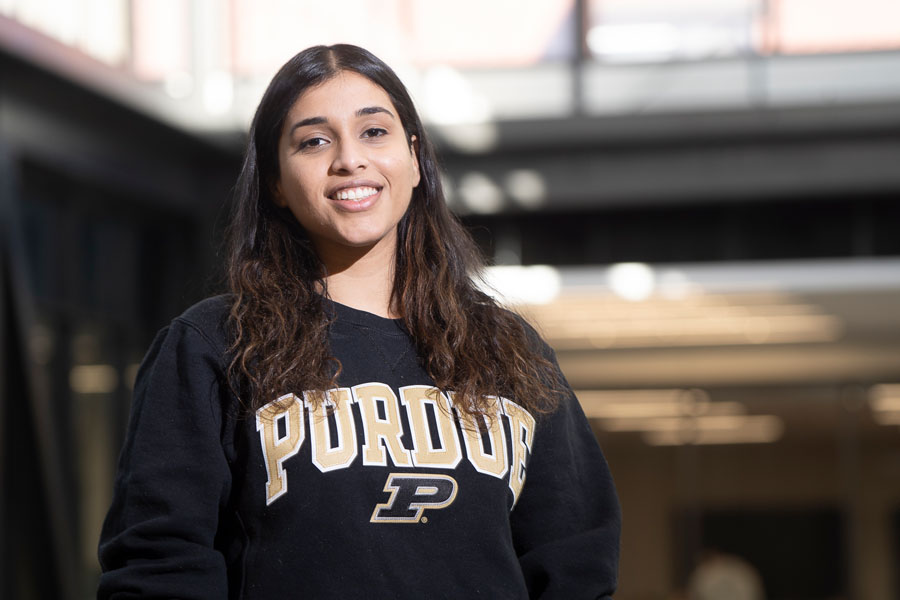
An eco-friendly soy-based face mask, a system to reduce food waste, a greener campus infrastructure initiative, and apps to optimize study plans and find study spots – these student innovations received honors and support in the College of Engineering’s inaugural Purdue Pitch Competition.
The mask solution won and four other projects were selected as finalists in the contest, organized by Purdue Engineering Student Council (PESC) and the College of Engineering.
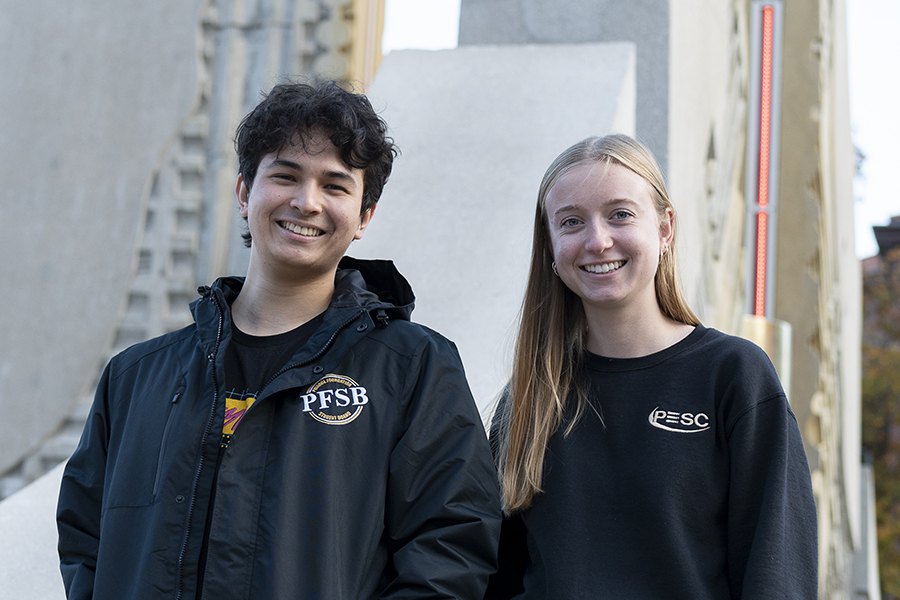
“The Purdue Pitch Competition provides students an exciting opportunity to pursue engineering design projects that will improve Purdue campus life and may benefit the wider community,” said Katelyn Zaloudek, an aeronautics and astronautics junior, who co-chaired the competition for PESC with Joshua Facello, an industrial engineering sophomore.
Zaloudek added: “In its first run, the competition proved to be a highly effective outlet for experiential learning and a launch pad for novel ideas. While creating solutions to positively impact the community, the students learned to apply technical knowledge acquired at Purdue.”
“It’s been amazing to see such an enthusiastic response with over 40 teams spontaneously forming to pursue ideas on enhancing the campus environment and learning experience for their fellow students,” said Alina Alexeenko, associate dean for undergraduate education for Purdue Engineering. “The College is glad to partner with PESC to enable these student-driven innovations.”
Winning entry: Soy Purdue
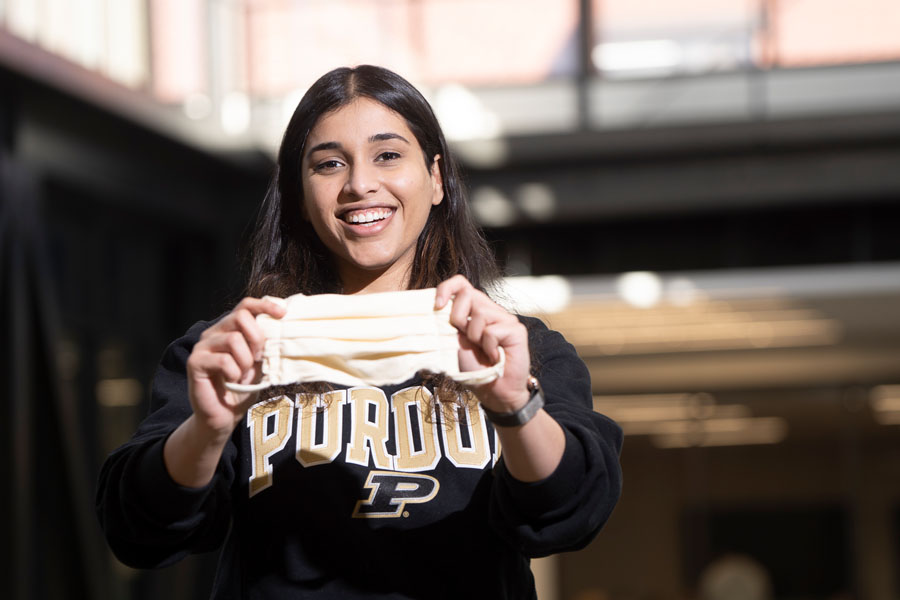
Aishwarya Chitnis, who developed the winning Soy Purdue mask idea, said: “The Purdue Pitch Competition offered a great opportunity for me to think out of the box and work with organizations to design and create a sustainable solution that can be implemented. Purdue’s support has accelerated the growth and increased the scale of a project that will make a difference. I learned that if you have an idea and helpful collaborators, you can work hard and make it come true.”
“With the COVID-19 pandemic and related mask requirements continuing, we need a long-term, sustainable alternative to disposable polypropylene/nylon face masks, which can’t be recycled and are polluting our streets, landfills and oceans,” explained Chitnis, a third-year veterinary medicine student. “The mask I designed will be manufactured from fabric made from soy byproducts that are typically discarded. Unlike the nylon masks, the soy mask will be biodegradable, reusable, inexpensive, more breathable, and available in multiple sizes. Its fabric also will have a natural antibacterial property conducive to long hours of wearing.”
Plans call for manufacturing some 50,000 Purdue-branded soy masks and distributing them on the West Lafayette campus this year, as well as providing bins to collect used masks for recycling or composting. Masks also will be sold at low prices to surrounding community residents. Chitnis noted that the new alternative will enable people who can’t afford currently available masks to avoid biases and stereotypes arising from wearing homemade face coverings.
“I am looking forward to working with Purdue to introduce the soy masks so we can together make educated choices that will help us leave this planet in a better state than we found it,” Chitnis said. “After all, we do not inherit the earth from our ancestors; we borrow it from our children. By adopting the eco-friendly face masks, we will both help protect Purdue and safeguard our planet. This one small change by man will be a giant leap for mankind.”
Chitnis praised PESC; Alexeenko; her faculty champion, Charles Babbs, senior lecturer in the Weldon School of Biomedical Engineering; and other Purdue organizations for their support and encouragement.
Purdue Engineering and Purdue University are helping to commercialize and implement the selected Purdue Pitch Competition innovations. Each team was paired with a College of Engineering faculty champion. Purdue Engineering gave the winner and each finalist team $500 for prototyping, plus academic scholarships and sponsorships to realize project goals on campus. Additionally, the winner will receive up to $5,000 in matching funds, for example, through EPICS (Engineering Projects in Community Service) or VIP (Vertically Integrated Projects) team support.
For Soy Purdue, Chitnis has participated in the Purdue Foundry’s IGNITE program to refine her idea for market, and she plans to serve on an EPICS team to further develop the solution. She also is talking with Purdue’s Office of Technology Commercialization and Protect Purdue about steps to make her vision a reality.
Other finalists
Erase the Waste
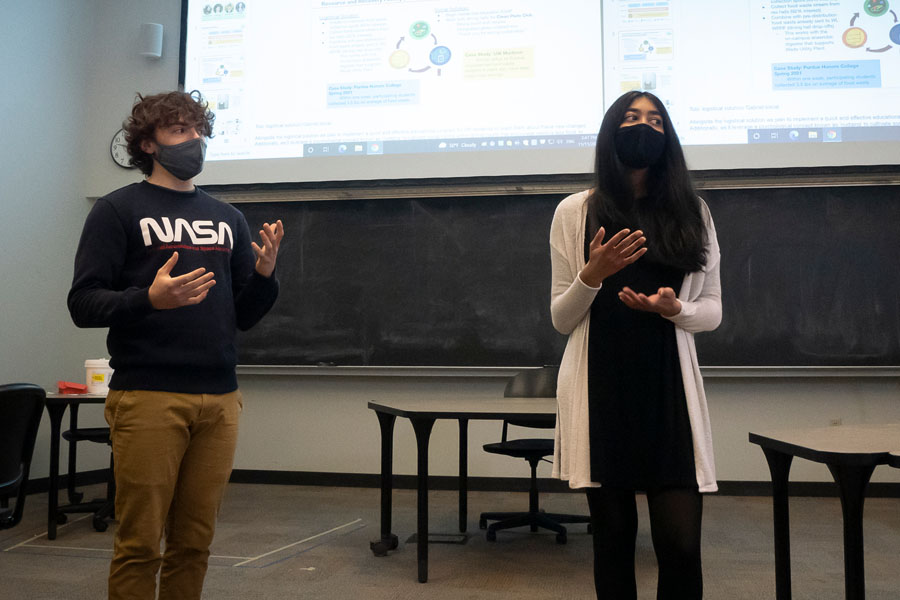
Students:
Anika Bhoopalam, sophomore, chemical engineering
Isha Gupta, junior, industrial engineering
Gabriel Leonard, senior, economics
Tobias Spitz, sophomore, electrical and computer engineering
Champion: Ernesto E. Marinero, professor, materials engineering and electrical and computer engineering
Goals are to minimize food waste in Purdue dining halls, as well as divert as much unavoidable food waste as possible from traditional landfills to West Lafayette’s anaerobic digester. By fostering greater mindfulness and providing a campus-wide system of collection points for students’ edible food waste, the project will enable Purdue to save money on tipping fees and energy costs, and to decrease its carbon footprint. The team is part of West Lafayette Students for Climate Action.
Green Infrastructure
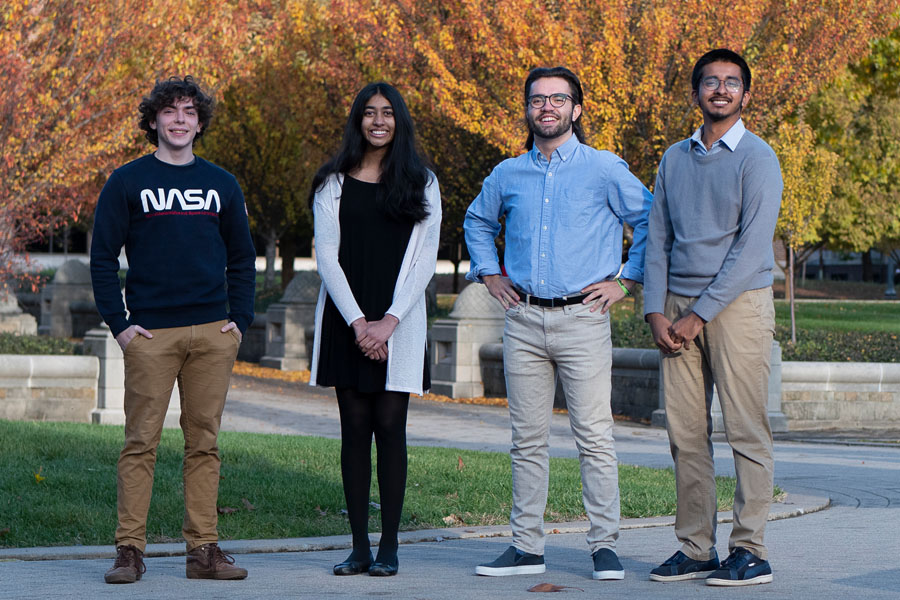
Students:
Anika Bhoopalam, sophomore, chemical engineering
Mason Merkel, senior, environmental and ecological engineering
Abhinav Prasad, senior, biomedical engineering
Tobias Spitz, sophomore, electrical and computer engineering
Champion: Ming Qu, professor, civil engineering and environmental and ecological engineering
Integrating natural spaces into Purdue’s urban infrastructure will assist the water cycle, capture carbon, mitigate urban heat islands and air pollution, and reduce maintenance costs. Strategies include creating more green roofs, providing carbon-capturing benches, landscaping with moss and native species, and improving rainwater harvesting and management. Plans call for developing a “green bus stop,” to incorporate moss, fans, solar panels, and a drip irrigation system to capture carbon dioxide and promote sustainability. The team is part of West Lafayette Students for Climate Action.
Pathfinder
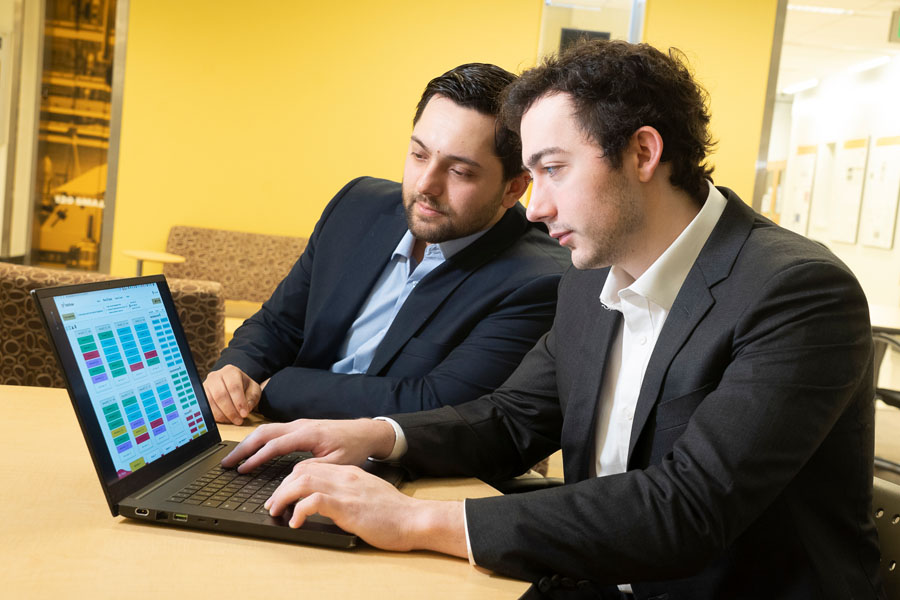
Students:
Daniel Gallups, junior, cybersecurity, Purdue Polytechnic Institute
Elan Mizhiritsky, senior, aeronautics and astronautics
Champion: Stephen Stewart, senior academic advisor, undergraduate education
Based on a newly designed student information system, the Pathfinder program is intended to help students and academic advisors determine the most efficient path to meet a student’s degree requirements. Among advantages, students will be able to graduate at a faster rate, minimize the risk of taking fallthrough courses, and identify additional efficient degree opportunities.
Study Spot
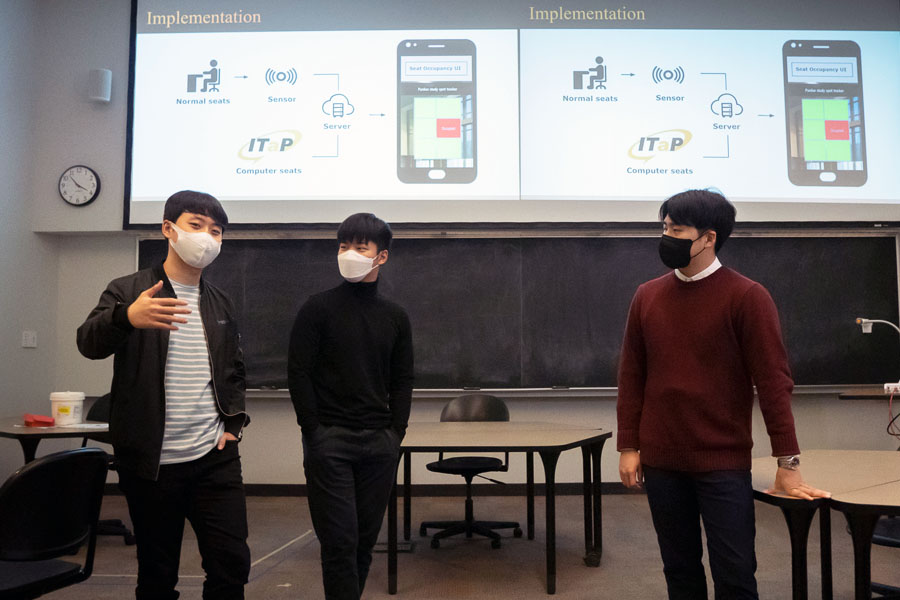
Students:
Byeongchan Jeong, senior, electrical and computer engineering
Juhyung Kim, senior, electrical and computer engineering
Young Joo Moon, senior, electrical and computer engineering
Champion: Xiaokang Qiu, assistant professor, electrical and computer engineering
The team developed an easily accessible platform to provide real-time information on available places to study in Purdue buildings, addressing a need related to increasing student enrollments. The system will use data from ITaP computers and motion detection sensors to track seat occupancy and display information on a user-friendly website. As a result, students will spend less time looking for study spots, giving them more study time, and the University will be able to use its facilities more efficiently.
Judging panel and comments
The Purdue Pitch Competition was judged by Arnold Chen, managing director of the Burton D. Morgan Center for Entrepreneurship; Beth McCuskey, Purdue vice provost for student life; Heather Servaty-Seib, associate vice provost for teaching and learning; and Cole Heald, PESC president.
“I really enjoyed seeing students take their ideas and work through the ideation to impact process,” Chen said. “It’s important that students have opportunities on campus to gain experience developing ideas and learning to communicate those ideas through these types of pitch competitions.”
McCuskey said: “It was an honor to serve as a judge for the Purdue Pitch Competition. It was clear that the teams spent considerable effort developing their ideas, prototypes and presentations, and that significant learning took place. All of the teams should be proud of their efforts.”
“It was truly encouraging to see the students bring their technical knowledge and skills to bear in addressing critical societal challenges,” Servaty-Seib said. “They are already living out Purdue’s land grant mission.”
Second Purdue Pitch Competition Planned
Information on the second Purdue Pitch Competition will be released in April 2022, with final judging in September. Prospective faculty champions may express interest by emailing saopurduepitch@gmail.com
Photo credits: Purdue University/Vincent Walter
More information:
Alina Alexeenko, alexeenk@purdue.edu
Katelyn Zaloudek, kzaloude@purdue.edu
